Linux traceroute命令
作者:佚名 时间:2023-08-31 09:29:03 阅读:(31)
作为开发人员针对网络的路由追踪是经常使用的,Linux系统的traceroute命令、windows系统的tracert命令,接下来云梦编程就为大家详细的介绍一下linux系统traceroute命令安装和路由跟踪指令详解,有需要的小伙伴可以参考一下:

1、介绍:
是用来检测发出数据包的主机到目标主机之间所经过的网关数量的工具。traceroute的原理是试图以最小的TTL(存活时间)发出探测包来跟踪数据包到达目标主机所经过的网关,然后监听一个来自网关ICMP的应答。发送数据包的大小默认为38个字节。
2、执行过程:
首先它发送一份TTL字段为1的IP数据包给目的主机,处理这个数据包的第一个路由器将TTL值减1,然后丢弃该数据报,并给源主机发送一个ICMP报文(“超时”信息,这个报文包含了路由器的IP地址,这样就得到了第一个路由器的地址),然后traceroute发送一个TTL为2的数据报来得到第二个路由器的IP地址,继续这个过程,直至这个数据报到达目的主机。
3、安装:
yum install traceroute
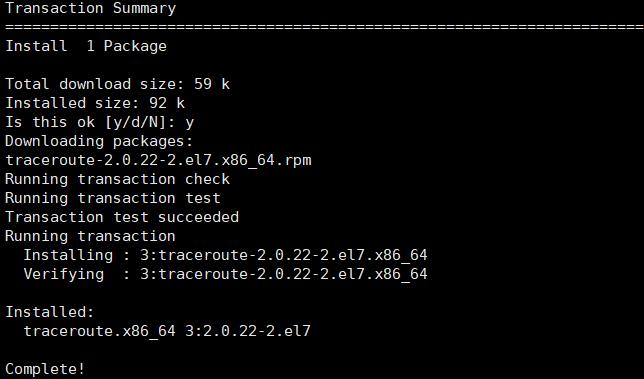
4、语法:
traceroute [ -46dFITnreAUDV ] [ -f first_ttl ] [ -g gate,... ] [ -i device ] [ -m max_ttl ] [ -N squeries ] [ -p port ] [ -t tos ] [ -l flow_label ] [ -w waittime ] [ -q nqueries ] [ -s src_addr ] [ -z sendwait ] [ --fwmark=num ] host [ packetlen ]
5、参数说明:
-4 Use IPv4 -6 Use IPv6 -d --debug Enable socket level debugging -F --dont-fragment Do not fragment packets -f first_ttl --first=first_ttl Start from the first_ttl hop (instead from 1) -g gate,... --gateway=gate,... Route packets through the specified gateway (maximum 8 for IPv4 and 127 for IPv6) -I --icmp Use ICMP ECHO for tracerouting -T --tcp Use TCP SYN for tracerouting (default port is 80) -i device --interface=device Specify a network interface to operate with -m max_ttl --max-hops=max_ttl Set the max number of hops (max TTL to be reached). Default is 30 -N squeries --sim-queries=squeries Set the number of probes to be tried simultaneously (default is 16) -n Do not resolve IP addresses to their domain names -p port --port=port Set the destination port to use. It is either initial udp port value for "default" method (incremented by each probe, default is 33434), or initial seq for "icmp" (incremented as well, default from 1), or some constant destination port for other methods (with default of 80 for "tcp", 53 for "udp", etc.) -t tos --tos=tos Set the TOS (IPv4 type of service) or TC (IPv6 traffic class) value for outgoing packets -l flow_label --flowlabel=flow_label Use specified flow_label for IPv6 packets -w waittime --wait=waittime Set the number of seconds to wait for response to a probe (default is 5.0). Non-integer (float point) values allowed too -q nqueries --queries=nqueries Set the number of probes per each hop. Default is 3 -r Bypass the normal routing and send directly to a host on an attached network -s src_addr --source=src_addr Use source src_addr for outgoing packets -z sendwait --sendwait=sendwait Minimal time interval between probes (default 0). If the value is more than 10, then it specifies a number in milliseconds, else it is a number of seconds (float point values allowed too) -e --extensions Show ICMP extensions (if present), including MPLS -A --as-path-lookups Perform AS path lookups in routing registries and print results directly after the corresponding addresses -M name --module=name Use specified module (either builtin or external) for traceroute operations. Most methods have their shortcuts (`-I' means `-M icmp' etc.) -O OPTS,... --options=OPTS,... Use module-specific option OPTS for the traceroute module. Several OPTS allowed, separated by comma. If OPTS is "help", print info about available options --sport=num Use source port num for outgoing packets. Implies `-N 1' --fwmark=num Set firewall mark for outgoing packets -U --udp Use UDP to particular port for tracerouting (instead of increasing the port per each probe), default port is 53 -UL Use UDPLITE for tracerouting (default dest port is 53) -D --dccp Use DCCP Request for tracerouting (default port is 33434) -P prot --protocol=prot Use raw packet of protocol prot for tracerouting --mtu Discover MTU along the path being traced. Implies `-F -N 1' --back Guess the number of hops in the backward path and print if it differs -V --version Print version info and exit
6、实例:
(1)、追踪baidu路由
traceroute www.baidu.com
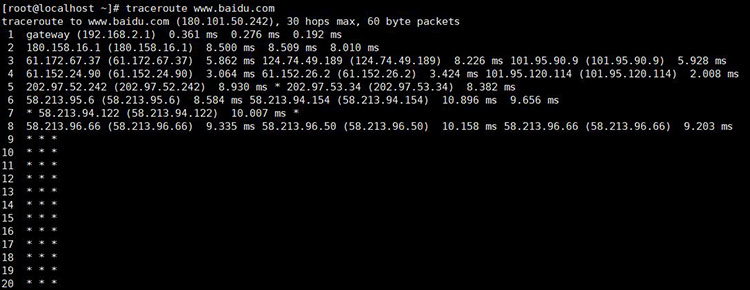
(2)、设置显示跳数
traceroute -m 4 www.baidu.com

(3)、显示IP不显示域名
traceroute -n www.baidu.com
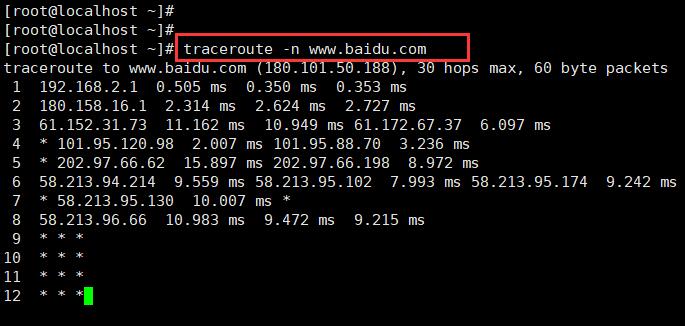
(4)、设置UD端口
traceroute -p 7788 www.baidu.com
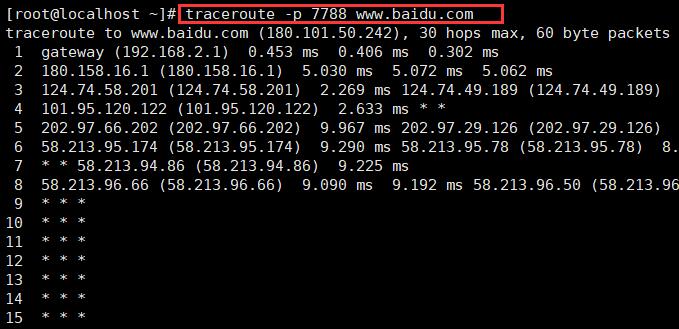
(5)、忽略普通的Routing Table,直接将数据包送到远端主机上
traceroute -r www.baidu.com
(6)、设置等待远端主机回报的时间
traceroute -w 5 www.baidu.com
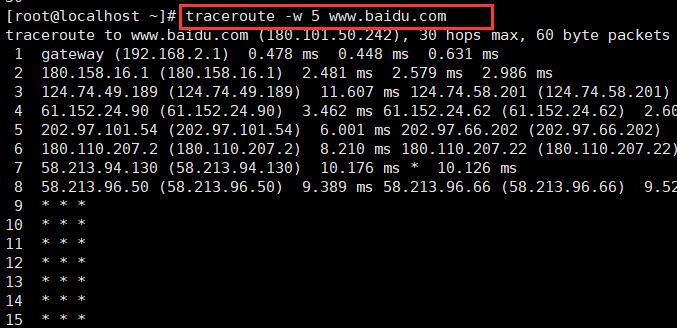
以上就是云梦编程为大家介绍的关于linux系统traceroute路由的安装与使用方法的全部内容了,希望对大家有所帮助,了解更多相关文章请关注云梦编程网!
- Centos中新建文件、新建文件夹命令
- permission denied什么意思
- curl: (52) Empty reply from server解决方法
- Internal Server Error的解决方法
- wget: unable to resolve host address的解决方法
- Linux提示“no such file or directory”解决办法
- /usr/bin/xauth: file /root/.Xauthority does not exist
- ipset重启生效的方法
- linux下Screen退出方法
- Empty reply from server解决方法